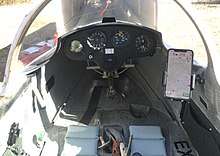Aviastroitel AC-4 Russia
The Aviastroitel AC-4 Russia is a Russian mid-wing, single-seat glider designed by Vladimir Egorovich Fedorov and produced by Aircraft Cooperative Mechta, which became Aviastroitel, now Glider Air Craft.[1][2]
| AC-4 Russia | |
|---|---|
.jpg) | |
| Role | Glider |
| National origin | Russia |
| Manufacturer | Aircraft Cooperative Mechta Aviastroitel Glider Air Craft |
| Designer | Vladimir Egorovich Fedorov |
| Introduction | 1993 |
| Status | In production |
| Produced | 1993-2003 and 2010-present |
| Number built | 60 |
| Unit cost |
US$21,000 (2003) |
| Variants | Aviastroitel AC-5M |
The aircraft is sometimes referred to as the Federov AC-4 Russia, Mechta AC-4, Fedorov Me7 Mechta, Kenilworth Me7, AS+ Ltd AC-4 or Aircraft Cooperative Mechta AC-4 Russia. It is currently marketed as the Glider Air Craft Solo AC-4.[2][3][4][5][6]
Design and development
The aircraft started out in 1989 as Fedorov's "Dream" project for the OSTIV World Class Sailplane 1993 design contest. It went through several design prototypes, named Mechta I, Mechta II and Russia I and II. The Russia II was the version submitted to the competition. The bid involved forming a new concern, the Aircraft Cooperative Mechta and building three hand-made prototypes. The aircraft performed well in the competition and the fly-off held in Oerlinghausen, Germany, but the lack of a manufacturing facility behind the design, plus political pressures put the design in second place, with the Polish Politechnika Warszawska PW-5 winning.[1][7][8]
The American team at the competition was very impressed with the Russian design, thought it would sell well for Club class and student solo flying and bought one of the three prototypes to take home with them. The aircraft proved popular and so a US distributorship under the name Russia 12.6 was set up to sell the Russian production. Since the Aircraft Cooperative Mechta could not mass-produce the aircraft they reformed as Aviastroitel. In 1994 US distribution was transferred to Mechta Sailplanes, LLC, which imported 18 Russia gliders. Aviastroitel created a second set of molds to respond to the demand and started a second assembly line with a total production capacity of 48 AC-4s per year. In 1997 William Ayd became US distributor under the name Russia Sailplanes, Inc. Production of the AC-4 was suspended in 2003 when the Russian government changed the requirements for industrial production, making building them uneconomical. In 2010 Aviastroitel became Glider Air Craft and production resumed.[7][8]
The aircraft is made from fibreglass. Its 12.6 m (41.3 ft) span wing employs a Wortmann FX-60-157 airfoil. The AC-4 can be fitted with a McCulloch MC-101B two-stroke engine of 12 hp (9 kW) that will sustain flight. A Ballistic Recovery Systems parachute is optional.[1][5]
Sixty Russias were completed, some as complete non-certified aircraft and some as kits for amateur construction.[1][2][3][4][7]
Operational history
In August 2011 there were 42 Russias registered in the United States,[3][9][10] five in the United Kingdom[11] and two in Canada.[4]
Variants
.jpg)
- Mechta I
- Initial 1989 prototype with 13.3 m (43.6 ft) wing span.[8]
- Mechta II
- 1991 prototype with 13.3 m (43.6 ft) wing span.[8]
- Russia I
- 1992 prototype with 11.0 m (36.1 ft) wing span.[8]
- Russia II
- 1992 prototype with 12.6 m (41.3 ft) wing span.[8]
- AC-4A Russia
- First production model introduced in 1993, with a 12.6 m (41.3 ft) wing span and taildragger landing gear.[1][8]
- AC-4B Russia
 AC4-B Instrument Panel
AC4-B Instrument Panel - Model with the main wheel set further back and a nose wheel. Also incorporates a larger cockpit for taller pilots. Introduced in 1996.[1][8]
- AC-4C Russia
- Improved model with retractable landing gear. Introduced in 1997.[4][8]
- AC-4CK Russia
- Improved model delivered as a kit.[3]
- AC-4D Russia
- Improved model with winglets.[6]
- AC-4M
- Motor glider model with a retractable engine, which was used as the prototype for the AC-5M. Introduced in 1999.[7][8]
- Solo AC-4
- Current production model.[2]
Specifications (AC-4)
Data from Sailplane Directory and company[1][2]
General characteristics
- Crew: one
- Length: 5.25 m (17 ft 3 in)
- Wingspan: 12.6 m (41 ft 4 in)
- Height: 0.38 m (1.25 ft)
- Wing area: 7.7 m2 (83 sq ft)
- Aspect ratio: 20.5:1
- Airfoil: Wortmann FX-60-157
- Empty weight: 140 kg (309 lb)
- Gross weight: 260 kg (573 lb)
Performance
- Stall speed: 69 km/h (43 mph, 37 kn)
- Never exceed speed: 220 km/h (140 mph, 120 kn)
- g limits: +5.3/-2.65
- Maximum glide ratio: 34:1 at 95 km/h (59 mph)
- Rate of sink: 0.8 m/s (160 ft/min) at 88 km/h (55 mph)
- Wing loading: 32.46 kg/m2 (6.65 lb/sq ft)
References
- Activate Media (2006). "Russia AC-4 Aircraft Cooperative Mechta". Archived from the original on 24 February 2014. Retrieved 7 August 2011.
- Glider Air Craft (n.d.). "Solo AC-4". Archived from the original on 22 October 2011. Retrieved 7 October 2011.
- Federal Aviation Administration (August 2011). "Make / Model Inquiry Results". Retrieved 7 August 2011.
- Transport Canada (August 2011). "Canadian Civil Aircraft Register". Retrieved 7 August 2011.
- Lednicer, David (2010). "The Incomplete Guide to Airfoil Usage". Archived from the original on 19 July 2011. Retrieved 1 July 2011.
- Bertrand, Noel; Rene Coulon; et al: World Directory of Leisure Aviation 2003-04, page 54. Pagefast Ltd, Lancaster OK, 2003. ISSN 1368-485X
- Aviastroitel (2006). "This Russian enterprise Aviastroitel". Retrieved 7 August 2011.
- Glider Air Craft (2009). "Our History". Archived from the original on 22 October 2011. Retrieved 7 October 2011.
- Federal Aviation Administration (August 2011). "Make / Model Inquiry Results". Retrieved 9 August 2011.
- Federal Aviation Administration (August 2011). "Make / Model Inquiry Results". Retrieved 9 August 2011.
- Civil Aviation Authority. "GINFO Search Results Summary". Retrieved 9 Aug 2011.
External links
| Wikimedia Commons has media related to Aviastroitel AC-4. |